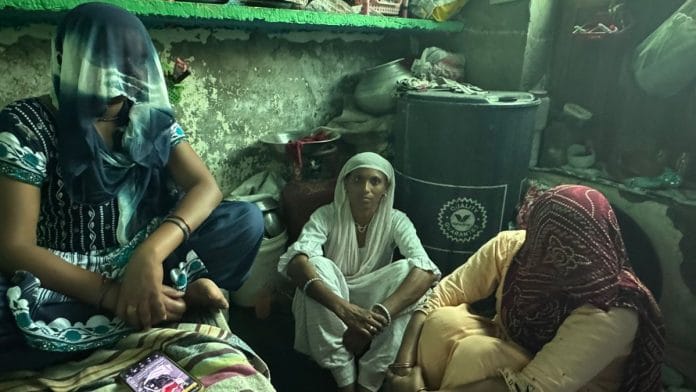Jind: It was a political rally like no other. After delivering his speech in Jind’s Julana, former Haryana Chief Minister Manohar Lal Khattar was walking toward his car when a 30-year-old Urmila shouted: Why do Haryanvi men import brides when they can’t give them dignity?
Urmila’s question wasn’t just meant for Khattar, it struck at the heart of one of Haryana’s most stubborn problems that has refused to go away for over three decades. Chronic son-preference culture and skewed sex ratio have manifested in perverse social practices such as brides bought from other states like West Bengal and Bihar. Now these brides, many of whom were children when they were ‘imported’ to the state, want to be treated better in their Haryanvi families.
Held back by the former CM’s security and the police, Urmila kept pleading for a meeting in vain. Khattar, who delivered the public speech on his party achievements on 14 May quickly got in his car and left.
Clad in a grey salwar kameez, holding the hand of her eight-year-old daughter, Urmila sat on the road in tears. Surrounded by a dozen mics from several regional news channels, she screamed, “Why do you insult us? You bring us from outside to insult us here.”
Her question challenges the shameful secret that Haryana’s rural families would rather not discuss, let alone shout from the rooftops of an election rally. The daughters-in-law from outside are treated as lesser citizens in their villages and homes.
“The government should put a ban on buying brides from outside. Only then will these men and their families understand our importance,” said Urmila, who lives in Karsola village, around four kilometres from the tehsil where Khattar delivered his speech.
Urmila is a ‘bought-in bride’, colloquially known as ‘mol ki bahu’ and she is fighting a battle for her dignity. But what’s worse than the plight of a bought bride is that of one whose husband has died. It’s a double whammy— the stigma of widowhood and the outsider tag. Urmila carries both burdens, she lost her husband five years ago.
With the sex ratio not improving despite the implementation of the government’s ‘Beti Bachao and Beti Padhao’ programme, even the officials are clueless about how to fight this deep-rooted son-preference culture.
In 2023, nine out of 22 districts of Haryana including Rohtak, Sirsa, Fatehabad, Sonipat, Yamuna Nagar, Jind, Charkhi Dadri, recorded a drop in the sex ratio at birth. The scarcity of women has led men to form ‘randa unions’ to push for their demands. During the 2014 Lok Sabha Election, one such union raised the slogan ‘Bahu Dilao, Vote Pao’ (bring bride, get vote)
The government should put a ban on buying brides from outside. Only then will these men and their families understand our importance
– Urmila
Urmila’s plight mirrors that of thousands of such women who are brought to Haryana as brides from poor families in the Hindi heartland states of Bihar, Uttar Pradesh, Chhattisgarh and Madhya Pradesh. From facing discrimination within their new families to being treated as ‘outsiders’ by society, these women find themselves on the margins. Even after they bear children, they are ostracised in a largely parochial Haryanvi society.
Both widowed and non-widowed bought-in brides have to bear the brunt of this. But after their husbands’ deaths, another layer of scrutiny follows these women—family members worry that they will take away their son’s property.
Activist Jagmati Sangwan, who is part of the All India Democratic Women’s Association, said the women are left to fend for themselves, with no government or community support or mobilisation. AIDWA sent a letter to the state government in February 2023 to present a status paper to recognise their troubles.
“You will be appalled to hear the answers of the government officials. We are being told that these brides from poor families are getting free food in Haryana. And that should be enough for them,” Sangwan said.
Also read: Haryana’s desperate bachelors bought wives. They turned out to be ‘loot-and-scoot’ brides
Like an untouchable
There is no formal union of the bought brides like that of the bachelor men in Haryana. But the women’s anger can no longer stay muffled in veiled sobs.
Sitting in a cramped room in Karsola, Urmila is cleaning her phone with the loose end of her dupatta. She credits her Redmi smartphone for helping in her fight against discrimination faced by “imported brides”.

“This phone has connected me to other women. I can’t read so I watch videos on YouTube to learn about my rights,” Urmila smiled. The phone didn’t come easy. Her brother bought it for her two years ago and she’s been paying him Rs 300 every month since.
Urmila works as a daily wage labourer on farms and gets paid Rs 500 for a full day of work but on most days she earns Rs 250 as she has to leave at 2 pm to pick her daughter up from school. She also gets a widow pension of Rs 3,000, which she sets aside for her daughter’s education.
Urmila married Kabul Singh 15 years ago through a middleman. In the first two years of her marriage, they lived in Madhya Pradesh where her husband did odd jobs. As soon as she came to Haryana in 2011, her husband’s family shut the door in her face.
“I couldn’t understand why. They wanted a bride and that’s why I was there,” said Urmila.
Kabul took Urmila with her and shifted to a one-room apartment in Julana. But that didn’t end her ordeal. Urmila said that she faced constant discrimination from her in-laws who would often address her as “Biharan”.
“They (in-laws) don’t even know my name,” Urmila lamented.
This name-calling is not limited to her in-laws, Urmila said that even women in the neighbourhood address her the same way.
This phone has connected me to other women. I can’t read so I watch videos on YouTube to learn about my rights
– Urmila
Her situation worsened after she lost her husband to cancer. She was not allowed to enter his house in Karsola, they feared she’d lay claim to his property. Urmila added that she is being cursed for giving birth to a girl. It was only after she wrote a complaint at Julana police station that was she given a room to live in. It has a separate entrance.
“I am not allowed to use the bathroom in the house. I have to cook, clean, and bathe in this room. Can you imagine?” Urmila said, looking around her room and pointing at a black water tank.
“It feels like I am untouchable.”
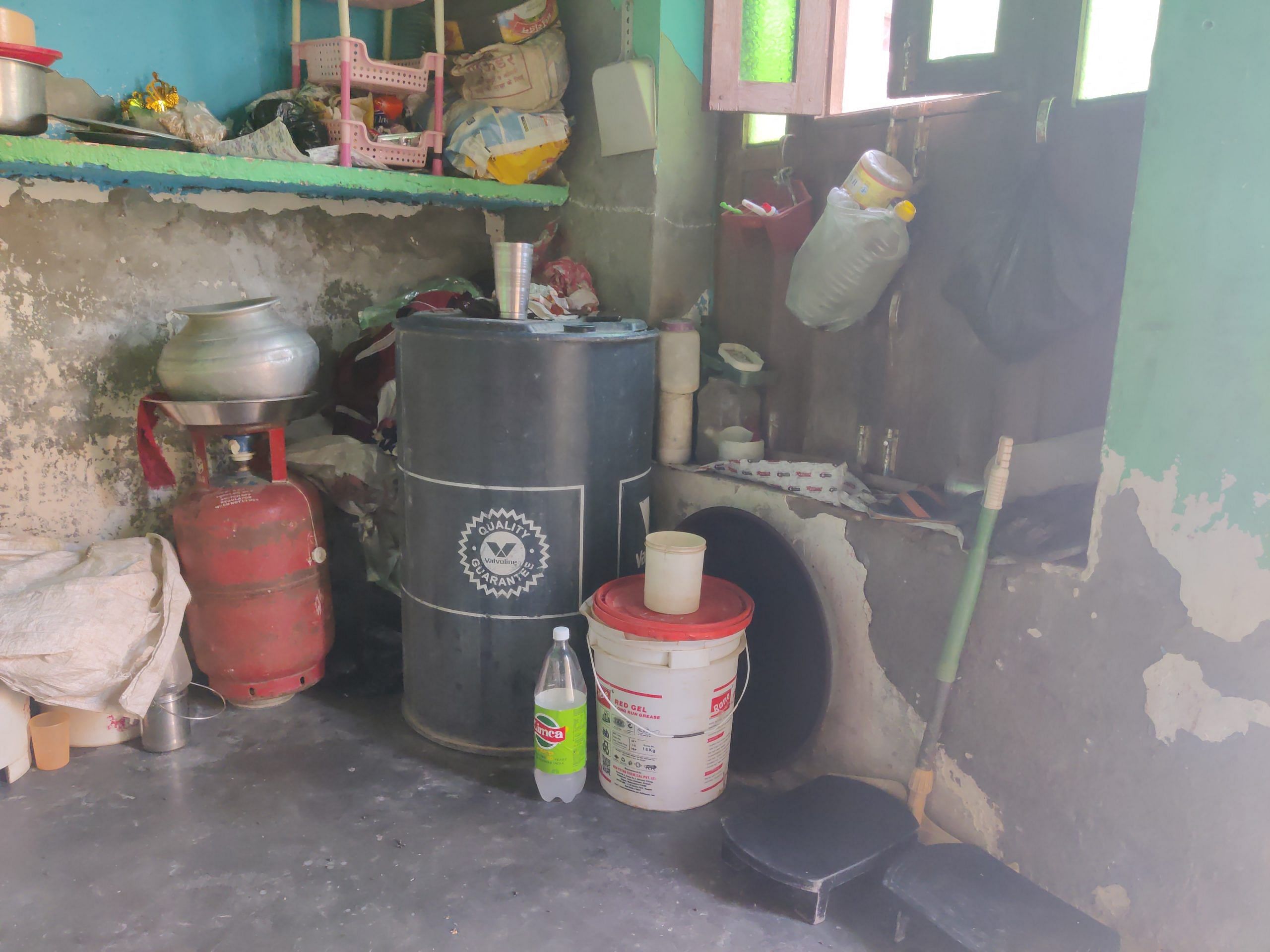
The village sarpanch Mahendra Singh said that he warned her in-laws to stop troubling her.
“I have also offered land to her in panchayat but she doesn’t trust us any more,” said Singh.
After the video of her questioning former CM Khattar went viral, Urmila said that her neighbours tell her about strangers showing up at her door.
“And when they see the door locked, they leave. I think they are journalists and local leaders who want to meet me. My daughter is writing my phone number on the door so that they can call me,” she said.
Also read: ‘Reverse dowry’, rape & ‘good houses of bad husbands’ — the hidden stories of Gujarat’s child brides
A sisterhood in the making
Another bought-in bride, four houses down from Urmila, said she was relieved when her husband died two years ago. The imported bride from Chhattisgarh said her husband would beat her every night and call her “bahar ki aurat” (woman from outside). The next morning, he would act as if nothing had happened.
“Till his last breath, he couldn’t accept me as a part of his family,” said the 31-year-old, biting her nails. Her husband died due to spurious liquor. They have two children together, a 12-year-old daughter and a 10-year-old son.
She and Gudi, another widowed bought-in bride, have bonded with Urmila over the humiliation all of them face at home. They often meet in Urmila’s room to share their troubles. Although from different states, the women interact in Haryanvi with each other. They have adopted the language and even the culture of covering their heads with a veil. They live like any native Haryanvi woman.
“You should not act afraid. They [Haryanvi men and their families] need us to take their family forward. We should know our worth,” Urmila asserted, standing by the bedside with her arm raised in the air like a politician giving a speech. On the wall behind her is a framed photo of her dead husband, adorned with a garland of artificial flowers.
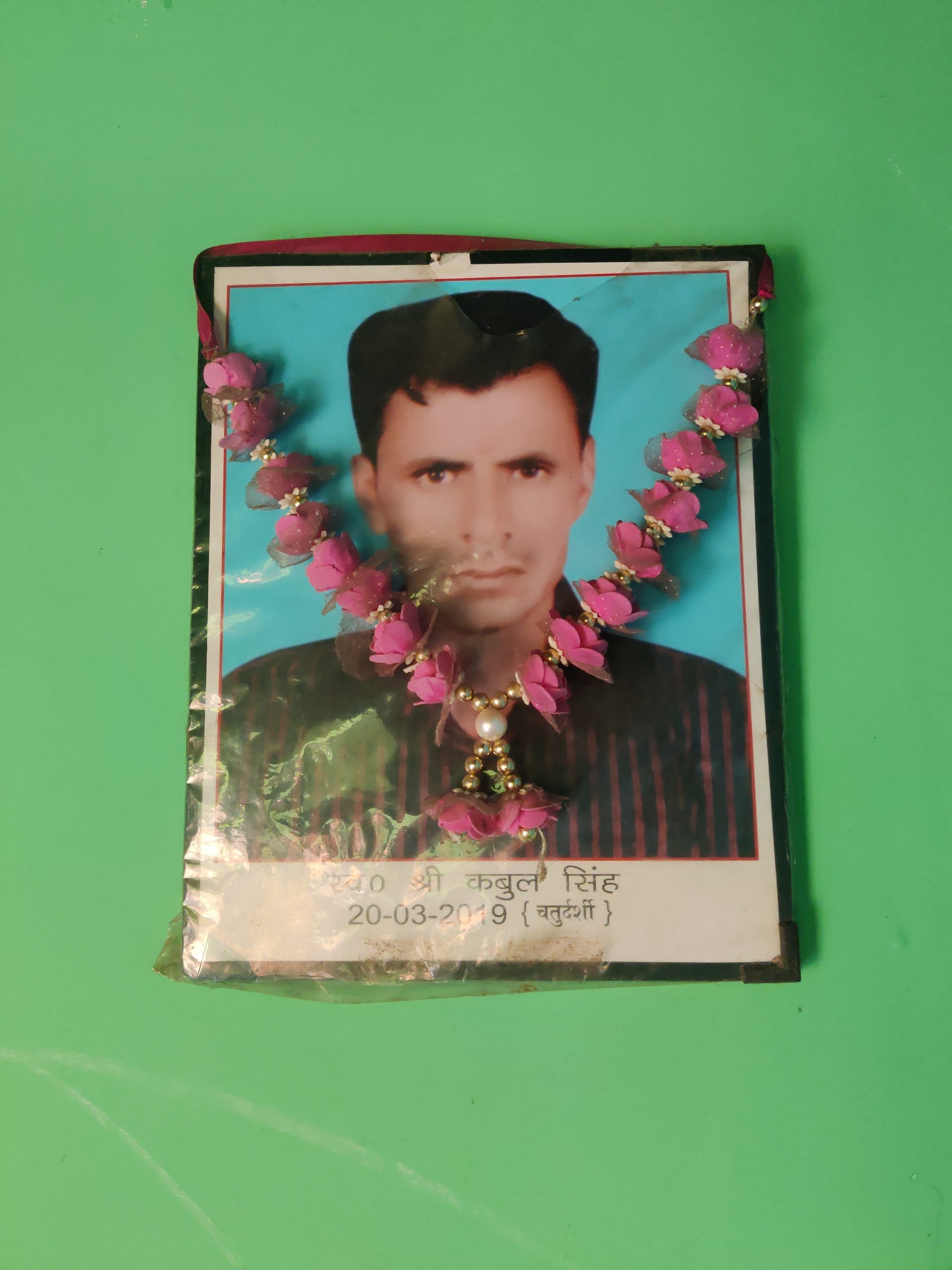
Gudi recalled how she warned her mother-in-law that if she caused more trouble, she would leave her 12-year-old daughter in Haryana and return to Chhattisgarh.
“My mother-in-law got frightened because she doesn’t want to raise a daughter. And since then she has been behaving a bit better,” laughed Gudi, as the other two women joined in.
The three women, who first met at the wedding of a villager eight years ago, go for strolls and buy groceries together. They often meet other brides like them in the market and exchange numbers. Urmila has emerged as the leader of the mol ki bahus in all of Julana and her room is their adda.
“This is how our group is taking shape. It’s easy to recognise another such woman through her facial features. It’s often us who start the first conversation,” said Urmila.
Although from different states, the bought-in brides interact in Haryanvi with each other. They have adopted the language and even the culture of covering their heads with a veil. They live like any native Haryanvi woman.
This would not have been possible had Urmila not stood up to her in-laws after her husband died. “Everyone faced such troubles but no one had the courage to speak up,” she said.
The incident also gave Urmila her identity back. Before she was known in her village as “doctor ki bahu” (doctor’s daughter-in-law), now everyone knows her as Urmila, the krantikari (revolutionary) mol ki bahu.
Her newfound fame led to other such brides across Julana seeking her out discreetly to discuss their problems. She is also constantly on the lookout for those who need help.
Urmila recalled how she identified a bought-in bride from Bihar in Julana. The bride was speaking in Haryanavi to a shopkeeper, but she could tell from her facial expressions that she was not from the state.
“I introduced myself to her. And within 10 minutes, she started crying while saying that she faces a lot of humiliation at home,” she said.
She has the same advice for everyone —“Speak for yourself. I am with you. Call me, if you face any trouble.”
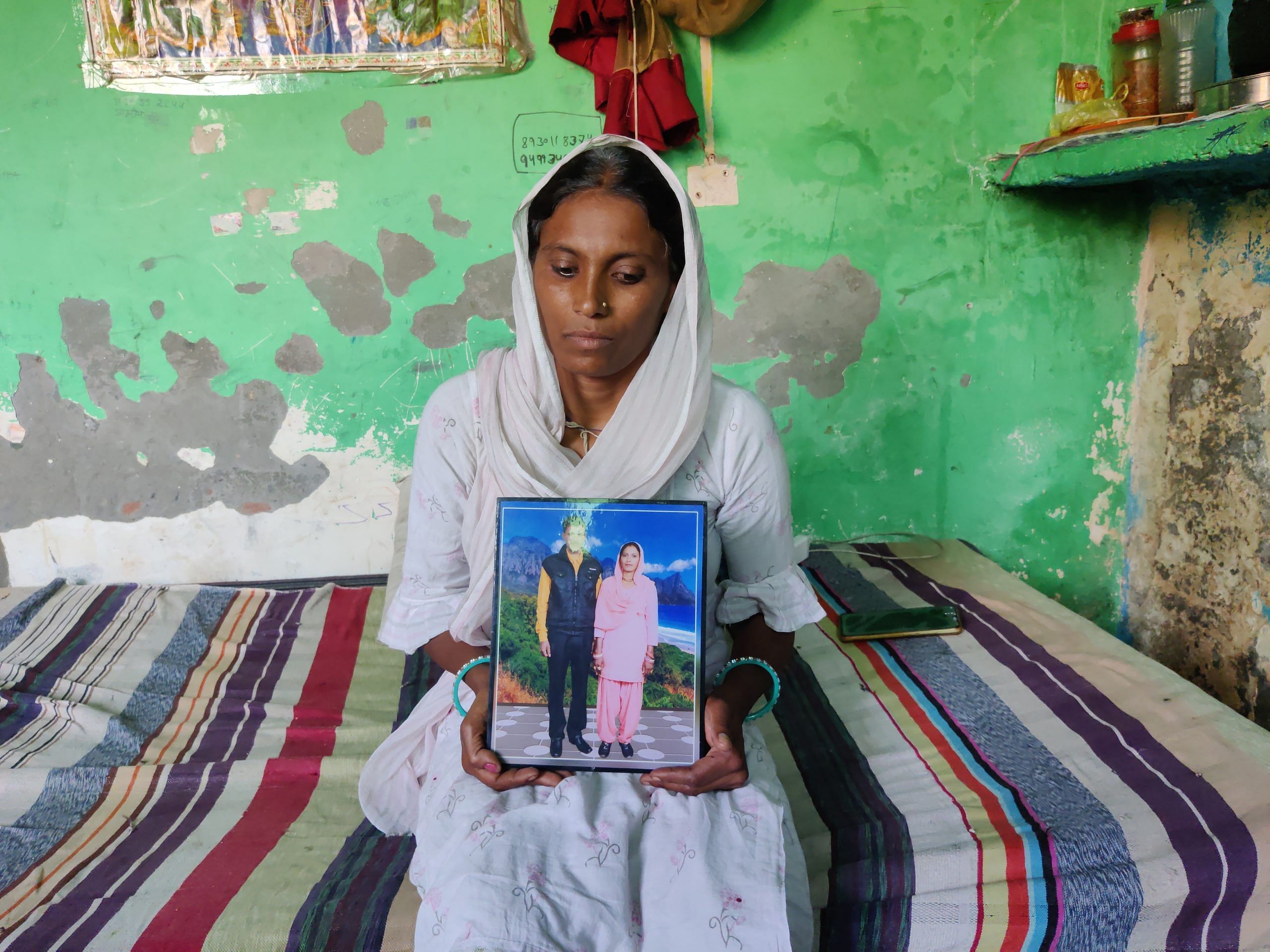
Urmila’s fearless attitude has made her an icon in the eyes of Karsola’s women. And the word has spread from her village to the entire tehsil—women whisper about the fearless bride.
Policemen at Julana police station know Urmila as a “bahar ki bahu” (a daughter-in-law from outside) who is fighting against her in-laws. An investigation officer added that such cases of discrimination are common but very few complaints reach the police station.
Now, Urmila has taken it upon herself to fight for all of them.
“It’s not only my fight now. I am fighting for every woman who is being discriminated against just because she is not a native,” said Urmila, as her daughter clapped.
Her mother-in-law has not even touched her daughter. “Had it been a son, things would have been different,” she added.
Before she was known in her village as “doctor ki bahu” (doctor’s daughter-in-law), now everyone knows her as Urmila, the krantikari (revolutionary) mol ki bahu.
But these issues are not even being acknowledged by the government. It is not important enough to affect the vote bank and hence, has not played a dominant part in policy making.
A district commissioner from southwest Haryana said that the state government does not recognise the plight of bought-in brides.
“It has never been a social issue for Haryana. First, it’s very important for the government to make marriage registration compulsory. This way we will have data on women who are from outside and that’s when we can address their issues. There is no data. Government knows this is happening but is least bothered about it,” he said.
Also read: Young women are jumping into wells in Barmer. It’s a suicide epidemic
The fear of a loot and scoot bride
The combination of desperate families and destitute brides has also given rise to a unique phenomenon. Many bought-in brides have fled with the families’ money after playing the role of a dutiful bahu.
These ‘loot and scoot brides’ have doubled the trouble for the other bought-in brides.
Urmila’s sister-in-law, Rekha, is convinced she is after their money and property.
“After her husband died. She has been eyeing his property but we won’t give that to her. We have given her a room with separate entry and that’s enough,” said Rekha, who’s from Haryana’s Rohtak.
She added that it’s hard to trust a non-native because “they can run away anytime”. Her mother-in-law, sitting on the cot, nods her in agreement.
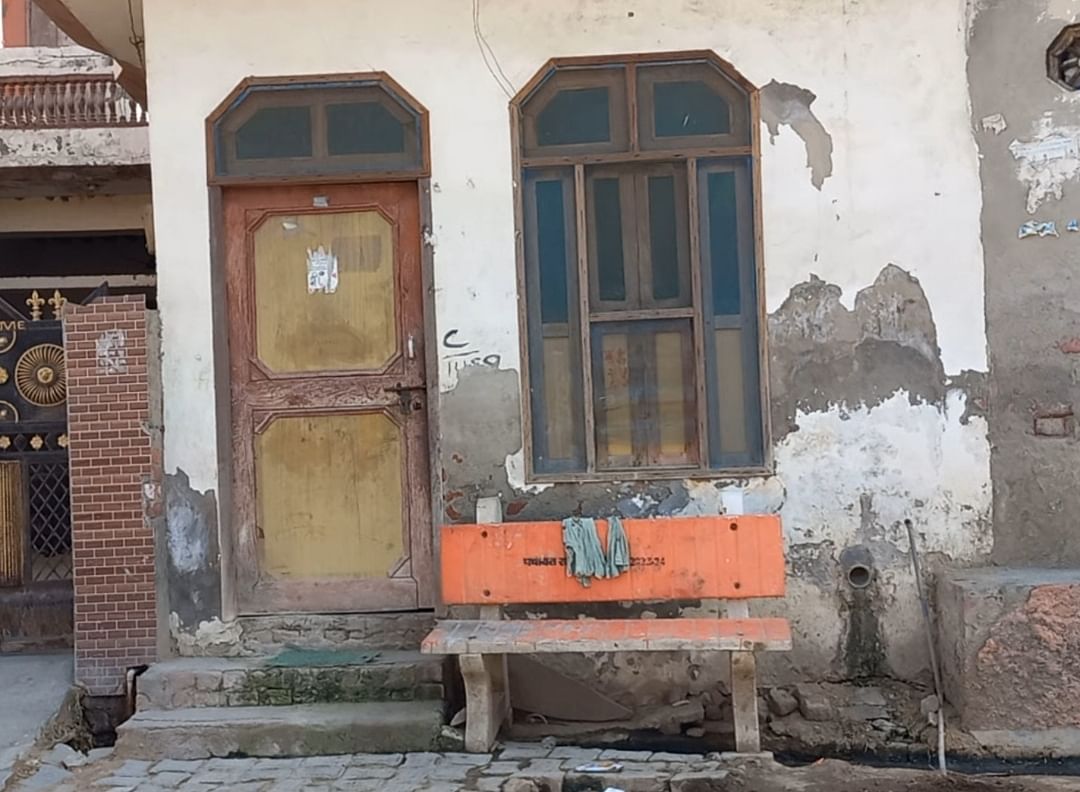
32-year-old Gudi says that despite living with her in-laws for 20 years, they are still fearful that she will run away with their jewellery and savings.
“My mother-in-law is always suspicious. She keeps an eye on my every move and checks her cupboard [where the money is kept] every now and then,” Gudi said.
Fatehabad women and child protection officer, Rekha Aggarwal said that she has never gotten complaints from bought-in brides in her 12 years of service. On the other hand, plenty of mothers-in-law come to her saying that the brides don’t cater to their needs.
After her husband died. She has been eyeing his property but we won’t give that to her. We have given her a room with separate entry and that’s enough
– Rekha, Urmila’s sister-in-law
Addressing the plight of the brides begins with the sex ratio. A government officer who has been at the forefront of cracking sex determination rackets said that it’s an ongoing process.
“From launching raids to conducting workshops, we are doing everything that can be done to make people understand that sons and daughters are equal. It can’t be changed overnight. While there has been some improvement, it largely depends on the thinking and we have failed to change that,” he said.
Aggarwal added that the practice is also fuelled by growing unemployment.
“Men are unemployed and they are not finding wives and are therefore settling for a woman from outside,” she said.
Karsola village is divided over the treatment of bought-in brides. Fifty-year-old Bala is on Urmila’s side.
“If somebody asks me about her, I tell them that Urmila is being treated badly by her in-laws. Everyone in the village knows but not everyone will say it openly,” she said. But Bala too is looking for a bride from another state for her son.
Seventy-year-old Ratan is in the other camp. She said they can’t help but be suspicious of brides brought from outside.
“When we can’t trust our own family members. How can we trust these brides?” she asked. The women who have gathered outside for their evening catch-up session agree with her.
Despite all this, Gudi, Urmila and their 31-year-old neighbour are bombarded with requests from villagers to scout for wives for their sons. The women said that the desperation is so high that the families offer gold rings and cash to them to secure a bride.
“I simply say no. I don’t want another woman to suffer the same fate. Mera jo hona tha ho gaya (Whatever was to happen with me has happened),” said the third woman. The others nod in agreement.
They’ve even been approached by their husbands’ relatives to marry their sons.
“They don’t feel any shame in asking us to marry their sons. We are just child-producing machines for them that will take their legacy forward,” said Urmila.
“And if we give birth to a girl child, then be ready to be thrown out of the house,” Gudi interrupted.
The third woman laughed and added, “I am lucky. I have a son.”
(Edited by Theres Sudeep)



